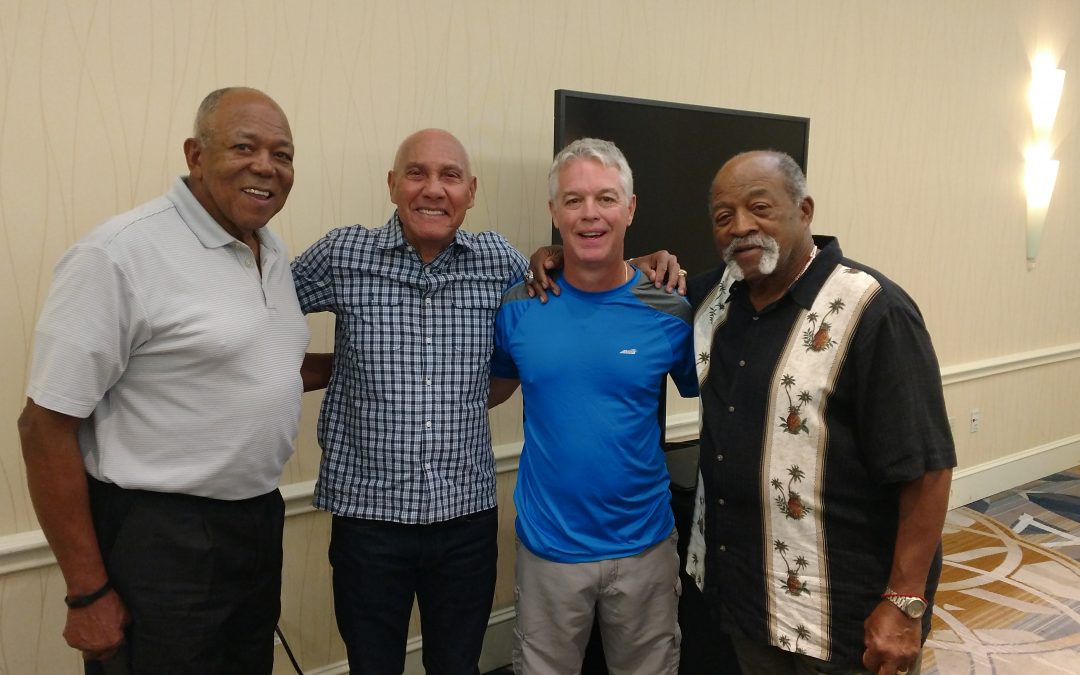“So, what do you want to know?” Those were the first words Luis Tiant said to me as we sat down with Tony Olivia and Bert Campaneris for a joint interview during the 2017 All-Star FanFest in Miami. It wasn’t so much a question, as it was a command. And that is what Luis Tiant was, a Commander. He was commanding me to prove to him that it was worth his time to answer my questions and he would decide during the next 60 seconds if he was staying or leaving, (and more than likely, taking Tony and Bert with him). Well, 60 seconds became 60 minutes of conversation that highlighted a childhood of athletic achievement, and a childhood working hard to prove he deserved the opportunity to play baseball.
Luis proved to be a natural storyteller. When he told stories, he told them with passion, crescendoing to the obstacles created by what his father experienced playing in the Negro Leagues. Luis grew up in Cuba, the son of Luis Tiant, Sr. a professional baseball player in the Negro Leagues, in Cuba and the Latin American Leagues. Tiant, Sr. did not want his son to play baseball, for one simple reason, segregation. Luis told me the story of when his father finally accepted the fact that he had the talent to be a professional.
 “He don’t want me to play. Because… the thing was, when he played here, he only can play in the Negro League, can never play in the big league. And what they (Tiant Sr friends) told me, he was better than me, not him (Tiant, Sr. didn’t say it), they played with him, according to my coach in winter ball. My manager, coach and they use to tell me, “No, you good, but your father was better than you.” He never got that opportunity. And then I guess he don’t want me to go through what he go through.
“He don’t want me to play. Because… the thing was, when he played here, he only can play in the Negro League, can never play in the big league. And what they (Tiant Sr friends) told me, he was better than me, not him (Tiant, Sr. didn’t say it), they played with him, according to my coach in winter ball. My manager, coach and they use to tell me, “No, you good, but your father was better than you.” He never got that opportunity. And then I guess he don’t want me to go through what he go through.
My father don’t want me to play. He wanted me to go to school. And then I was select to go to Mexico in 1957, you know, (on the National Team). And he don’t want me to go. And my mother told him, “Why not? Let him go. That thing won’t happen all the time and they picked him to go, Let him go.” (My Father says) “No, no, no.” And then finally he let me go. And then what happened, I go, we played the tournament in Mexico, then when I come back, you know I keep pitching. I hurt my elbow; take me like a month and a half about two months to coming back. They had top players again and I played in Cuba then, in Cuba with the Social Club. I used to play for the team, they would have a team. And then some of (Father’s) friends telling him, you better go see your boy, cause he’s good. I guess he tried thinking about it and he come and see me. What he do? he hide. He come in the bus, he got to the ballpark and went by the outpost over there, Route 28 that’s the bus station.
That’s the open part (of the ballpark), then the home plate; this is the mound and home plate right there. And then you see the car and the bus coming behind and then (the bus) stop in the corner. While I’m pitching, taking the sign and I saw him get out of the bus, he go behind the car. He no come in right way, he stood behind it. That day I pitching, I was pitching and I shut ‘em out, the other team. And then after the game he walking across the avenue, come shaking my hand and hug me and then from that point on he start telling me little tricks here, how to hold the ball here, but before that, he never — he don’t want me to play. Because of my mother that’s when I play. And it was simple because, you know, your father play and then you want to play, he not want you to play you start thinking about what’s the matter with him? Well, when I come here I found out why (laughing).”
As we finished our interview, Luis, Tony, and Bert seemed to enjoy those 60 minutes telling stories about playing baseball as kids, something they are rarely, if ever asked about. I learned a lot interviewing them, I even found out why Luis stopped playing catcher and became a pitcher (involves a foul ball and walking like a duck for 4 days) and what gave him the confidence and drive to leave Cuba for the United States to become a professional baseball player.
Luis Tiant was a unique individual, as unique as his windup. I vividly remember our neighborhood whiffle ball games and mimicking his windup, the more outrageous, the better. The only thing we couldn’t do, as 10-year-olds, was grow that fantastic Fu Manchu mustache.
Luis left me with this quote:
“How long you gonna be a kid? Not too long. When you get fourteen, fifteen that gone being a kid, see, that little thing is gone, you’re going to be old for a long time. Why would you want to take that away from the kid? Let the kid be a kid. Let him enjoy.”
RIP Luis Tiant.
All the Best!
Kelly G. Park


Recent Comments